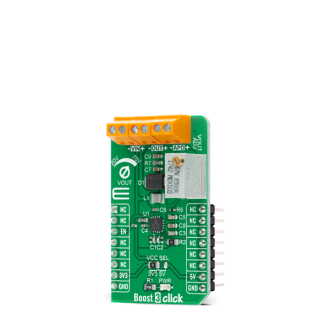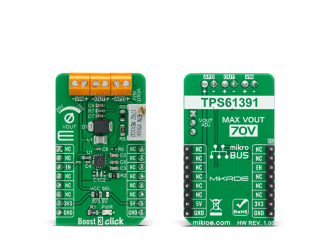
We strongly encourage users to use Package manager for sharing their code on Libstock website, because it boosts your efficiency and leaves the end user with no room for error. [more info]

Rating:
Author: MIKROE
Last Updated: 2020-10-02
Package Version: 1.0.0.0
mikroSDK Library: 1.0.0.0
Category: Boost
Downloaded: 3236 times
Not followed.
License: MIT license
Boost 3 Click is a compact add-on board that contains a boost converter with an integrated current mirror function. This board features the TPS61391, a 700-kHz pulse-width modulating (PWM) Step-Up converter with a 70V switch FET with an input voltage up to 5.5V from Texas Instruments.
Do you want to subscribe in order to receive notifications regarding "Boost 3 click" changes.
Do you want to unsubscribe in order to stop receiving notifications regarding "Boost 3 click" changes.
Do you want to report abuse regarding "Boost 3 click".


Library Description
The library covers the necessary function that enables the usage of the RTC 11 Click board. User can enable or disable the device.
Key functions:
void boost3_dev_enable ( uint8_t state ); - Function is used to enable or disable the device.Examples description
The application is composed of three sections :
void application_task ( )
{
char cmd;
if ( UART_Rdy_Ptr() )
{
cmd = UART_Rd_Ptr( );
cmd -= 48;
boost3_dev_enable( cmd );
if( cmd == BOOST3_ENABLE )
{
mikrobus_logWrite( "The device is turned on!", _LOG_LINE );
mikrobus_logWrite( "Use on-board potentiometer", _LOG_LINE );
mikrobus_logWrite( " to adjust 'Vout' voltage", _LOG_LINE );
}
else
{
mikrobus_logWrite( "The device is turned off!", _LOG_LINE );
}
}
}
Other mikroE Libraries used in the example:
Additional notes and informations
Depending on the development board you are using, you may need USB UART click, USB UART 2 click or RS232 click to connect to your PC, for development systems with no UART to USB interface available on the board. The terminal available in all MikroElektronika compilers, or any other terminal application of your choice, can be used to read the message.